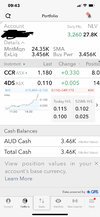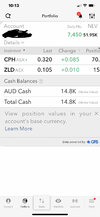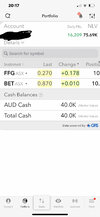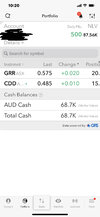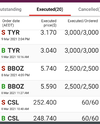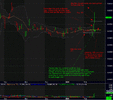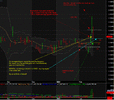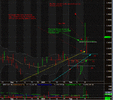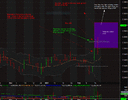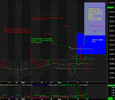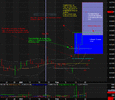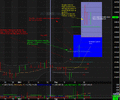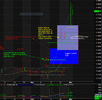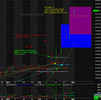tech/a
No Ordinary Duck
- Joined
- 14 October 2004
- Posts
- 20,447
- Reactions
- 6,477
1. Agree. And what that actually means in practice is salvaging losing trades. For example adding an Options leg or a paired trade, etc. to the trade in question to change it from what is was, to something else.
You could but I dont. I dont allow my losses to continue to the point where they need salvaging.
Im never going to eradicate losses no matter what I do. But I can mitigate them.
2. If you are setting some form of stop (at say a resistance/support level) or maximum dollar loss, etc. yes, you'll be provided quite quick feedback. That is not necessarily the same as 'analysis', that is simply a timing or entry issue.
We differ here I dont wait for a stop to be taken out for proof that my analysis is wrong.
For me if a trade doesn't go immediately in my favor then something is not right. Id rather be wrong about being wrong
than wait until the village idiot can see Im definitely wrong.
Importantly an INITIAL stop is a point which allows me to position size from---its NOT fixed it can and does move UP---Mine do all the time.
3. Yes, but, it can still turn to custard. Experience in discretionary trading is the big differentiator from mechanical trading. Novices, simply by definition lack this 'skill'.
Of Course That's why Im doing this thread!
4. Again, experience. Second, it really depends on how you set your SL. A SL set re. risk, may not be the accurate placement in the market re. support/resistance etc.
And again I expect my trade to move immediately in my intended or anticipated direction if it doesn't I move my stop UP
5/6/. Again, experience (often a subjective assessment) will play a significant part.
Yes and I (Less often) get these two situations entirely wrong. Id rather be out early on an anticipated Sharp reversal than late.
If Im early on a suspected reversal and I get it wrong my re entry wont have caused a lot of damage. Procrastination could cost
a great deal. Again Im hoping to give some ways of anticipating moves to help those assessing a trade or two.
7. Moving to SL to BE manages risk, but can often reduce reward. Again, that BE point should have some reference (other than your personal need) to market levels.
Im not in agreement with this. (from MY experience) Yes it CAN in a very limited number of cases in my experience. Id much rather exit at B/E and watch a fall below--then observe a reversal in my direction---which I can re enter---than hold on HOPING my stop doesn't get taken out for a guaranteed loss. Diluting my R/R by the width of my stop loss that is/was set in stone.
8. Agreed.
9. This question is undergoing some analysis on @peter2 thread currently. Ultimately, if we could all pick the number 1 return, we would all put 100% into that. Pretty much impossible on a consistent basis. Therefore the question of narrow or broad is an issue, but it is unlikely to be determinative, as there are other variables at play.
Haven't seen Peters discussion--I should have a look.--But---
Ponder this- I generally trade 3- 4 imminent or active movers if they dont move I either move my stop UP if I think a day may change things or a lower time frame stop makes more sense. If one or two move Ill load them accordingly. If its clear its really fast Ill hit it with a larger position increase calculating Stops and possible exits on the fly. If its moderate in moving in my direction I will either do nothing or increase a more moderate amount.---either way I want to maximize clear opportunity --- OR --- make room for another.
10. I hate being wrong. It is currently fashionable in the literature to 'love being wrong' as this is educational and will improve you in the long run. An analogy: athletes: how often do you hear the champions state that they love to lose? Never. To win, you have to hate or fear losing so much, that you are prepared to do whatever it takes to win. Trading is like that. If you trade and you lose, lose, lose...odds are you will stop trading. Far better you first learn how to trade. Then trade. And win. From the Reefcap days, I know tech/a, WayneL, Country Lad and Joules (there maybe a couple of others lurking) that's it. Out of 100's of members. Trading is a tough game. Discretionary is hard and mentally debilitating if you lose. I almost guarantee you, if you lose often, but limit your losses, at some point you will decline to take that small loss and you will end up with a massive loss. Not only will that hurt you financially, it will likely break you mentally and emotionally. Your trading career will be over.
Again Duc I --This time-- Strongly disagree.
If Im wrong and can identify it quickly and do something about it I have an opportunity to be better.
As an athlete if I lose and I will---That shows me I can be better. If Im a boxer as an example or an MMA fighter and get KO'd or Submitted you can bet I did something wrong--I wasn't quick enough or I didn't know how to counter a move or I didn't protect myself. If I wish to stay in the game Id better improve!
Id rather get hit a few times than KO'd ---- Ill take any number of punches. Every now and then Ill have my own KO victory.
Trading is no different---Your going to be wrong--better know how to survive and not get knocked out!
It works --- very well.
You could but I dont. I dont allow my losses to continue to the point where they need salvaging.
Im never going to eradicate losses no matter what I do. But I can mitigate them.
2. If you are setting some form of stop (at say a resistance/support level) or maximum dollar loss, etc. yes, you'll be provided quite quick feedback. That is not necessarily the same as 'analysis', that is simply a timing or entry issue.
We differ here I dont wait for a stop to be taken out for proof that my analysis is wrong.
For me if a trade doesn't go immediately in my favor then something is not right. Id rather be wrong about being wrong
than wait until the village idiot can see Im definitely wrong.
Importantly an INITIAL stop is a point which allows me to position size from---its NOT fixed it can and does move UP---Mine do all the time.
3. Yes, but, it can still turn to custard. Experience in discretionary trading is the big differentiator from mechanical trading. Novices, simply by definition lack this 'skill'.
Of Course That's why Im doing this thread!
4. Again, experience. Second, it really depends on how you set your SL. A SL set re. risk, may not be the accurate placement in the market re. support/resistance etc.
And again I expect my trade to move immediately in my intended or anticipated direction if it doesn't I move my stop UP
5/6/. Again, experience (often a subjective assessment) will play a significant part.
Yes and I (Less often) get these two situations entirely wrong. Id rather be out early on an anticipated Sharp reversal than late.
If Im early on a suspected reversal and I get it wrong my re entry wont have caused a lot of damage. Procrastination could cost
a great deal. Again Im hoping to give some ways of anticipating moves to help those assessing a trade or two.
7. Moving to SL to BE manages risk, but can often reduce reward. Again, that BE point should have some reference (other than your personal need) to market levels.
Im not in agreement with this. (from MY experience) Yes it CAN in a very limited number of cases in my experience. Id much rather exit at B/E and watch a fall below--then observe a reversal in my direction---which I can re enter---than hold on HOPING my stop doesn't get taken out for a guaranteed loss. Diluting my R/R by the width of my stop loss that is/was set in stone.
8. Agreed.
9. This question is undergoing some analysis on @peter2 thread currently. Ultimately, if we could all pick the number 1 return, we would all put 100% into that. Pretty much impossible on a consistent basis. Therefore the question of narrow or broad is an issue, but it is unlikely to be determinative, as there are other variables at play.
Haven't seen Peters discussion--I should have a look.--But---
Ponder this- I generally trade 3- 4 imminent or active movers if they dont move I either move my stop UP if I think a day may change things or a lower time frame stop makes more sense. If one or two move Ill load them accordingly. If its clear its really fast Ill hit it with a larger position increase calculating Stops and possible exits on the fly. If its moderate in moving in my direction I will either do nothing or increase a more moderate amount.---either way I want to maximize clear opportunity --- OR --- make room for another.
10. I hate being wrong. It is currently fashionable in the literature to 'love being wrong' as this is educational and will improve you in the long run. An analogy: athletes: how often do you hear the champions state that they love to lose? Never. To win, you have to hate or fear losing so much, that you are prepared to do whatever it takes to win. Trading is like that. If you trade and you lose, lose, lose...odds are you will stop trading. Far better you first learn how to trade. Then trade. And win. From the Reefcap days, I know tech/a, WayneL, Country Lad and Joules (there maybe a couple of others lurking) that's it. Out of 100's of members. Trading is a tough game. Discretionary is hard and mentally debilitating if you lose. I almost guarantee you, if you lose often, but limit your losses, at some point you will decline to take that small loss and you will end up with a massive loss. Not only will that hurt you financially, it will likely break you mentally and emotionally. Your trading career will be over.
Again Duc I --This time-- Strongly disagree.
If Im wrong and can identify it quickly and do something about it I have an opportunity to be better.
As an athlete if I lose and I will---That shows me I can be better. If Im a boxer as an example or an MMA fighter and get KO'd or Submitted you can bet I did something wrong--I wasn't quick enough or I didn't know how to counter a move or I didn't protect myself. If I wish to stay in the game Id better improve!
Id rather get hit a few times than KO'd ---- Ill take any number of punches. Every now and then Ill have my own KO victory.
Trading is no different---Your going to be wrong--better know how to survive and not get knocked out!
It works --- very well.
Last edited:

